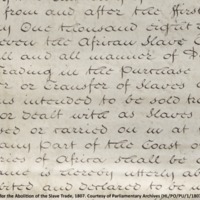
Hetty, Esther and Me
Hetty, Esther and Me was an original drama researched, written and performed by Trafford Youth Service and 15 African Caribbean girls from Stretford High School. The play was performed at Quarry Bank Mill, a working Georgian cotton mill on the outskirts of Manchester, owned by the National Trust. The play centred on connections between cotton produced by slaves and child labour in English mills, and the wider social issues of slavery and poverty during the Industrial Revolution. The story was told through the relationship between a slave girl (Hetty), a young mill worker (Esther) and a group of young women living in present-day Trafford.
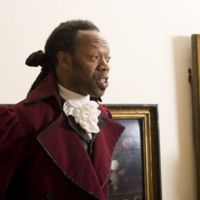
Breaking Chains - Sheffield Civil Rights
Breaking Chains - Sheffield Civil Rights was a project by Sheffield Galleries and Museum Trust to look at the slave trade and to celebrate Sheffield’s heritage by exploring the role local campaigners played in securing workers' rights. The resources targeted Key Stage 2 pupils. There was a particular focus on the visit to Sheffield by the African abolitionist Olaudah Equiano in 1790. Actor Joe Williams played Equiano in a dramatisation still available to view on the teaching resource. Featured here are some of the downloads available.
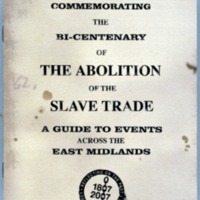
A Guide to Events Across the East Midlands
A guide to bicentenary activities and events in museums, archives and other venues across the East Midlands - Leicestershire and Rutland, Nottinghamshire, Northamptonshire, Derbyshire and Lincolnshire - was produced by Museums, Libraries and Archives East Midlands and Renaissance East Midlands. These events commemorated local connections to the abolitionist movement and to slavery. For example, Manor House Museum in Kettering produced a loans box containing material on William Knibb, a local abolitionist. Rothwell Arts and Heritage Centre produced an exhibition on the life of Rothwell-born missionary John Smith. Derby City Museums and Gallery worked with an artist and young people to explore Derby's industrial heritage and its links to the slave trade using The Silk Mill, Derby's Museum of Industry and History, as inspiration. Chesterfield Local Studies put together a touring exhibition to explore Derbyshire connections to the slave trade. A community commemorative event organised by Lincolnshire County Council and Lincolnshire African and Caribbean Support Group included a service of remembrance and the release of 200 'Freedom' balloons from Lincoln City Square on 24 March 2007.
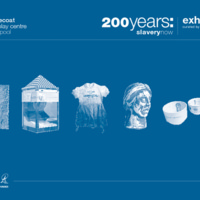
200 Years: Slavery Now
Bluecoat Display Centre is a contemporary craft and design gallery in Liverpool. The 200 Years: Slavery Now exhibition aimed to draw attention to modern slavery, both within the UK and in the wider international context. It brought together ten artists whose work reflected these concerns, and who were committed to highlighting the existence of slavery today through the creation of artefacts and the development of personal narratives. Materials used included ceramics, mixed media installations and textiles. Some of the themes covered included the exploitation of migrant workers, sex trafficking, 'sweat shop' mass production, and commemorating the Middle Passage and the workers of Manchester's cotton mills. The exhibition was curated by Professor Stephen Dixon, with the support of the Craft and Design Research Centre, MIRIAD, at Manchester Metropolitan University.
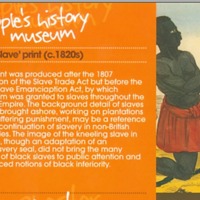
Revealing Histories: Remembering Slavery (People's History Museum)
Events at the People's History Museum in Manchester included a Revealing Histories trail, which highlighted museum objects with links to slavery, such as 'The Slave' print from the 1820s. A living history performance, 'How do you plead?', featured a representation of the Chartist leader William Cuffay, whose campaign for the right to vote saw him transported to Tasmania for treason.
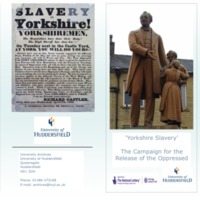
Yorkshire Slavery
Leeds-born businessman Richard Oastler was a leading figure in the 19th century campaign to end child slavery in the factories and mills of Yorkshire. The University of Huddersfield Archives, West Yorkshire Archives, Huddersfield Local History Library and Kirklees Museums and Galleries hold significant sources relating to the Huddersfield centred campaign against 'Yorkshire Slavery'. This project devised an exhibition ('The Past and Present of the Slave Trade') and heritage trail, and ran workshops for school children, local societies and youth theatres. A conference was held, and the University of Huddersfield Press later published John A. Hargreaves and E. A. Hilary Haigh, 'Slavery in Yorkshire: Richard Oastler and the campaign against child labour in the Industrial Revolution' (2012).
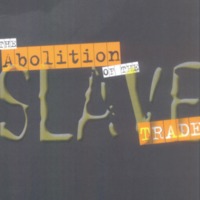
The Abolition of the Slave Trade
Kirklees Council ran a range of events in 2007, focused on local connections with slavery and abolition. Kirklees Civic Sunday was the official commemoration at Huddersfield Parish Church, with a performance by a local gospel choir and a presentation by actors as historical characters. The links between Yorkshire and the Caribbean were also explored: 8,500 people of African-Caribbean descent live in the borough of Kirklees. Events such as the Jamaica National Independence Cultural Festival, Deighton Carnival and Huddersfield Carnival celebrated African and Caribbean culture. Part of the Kirklees programme was to host the Equiano Project's touring exhibition at the Hudawi Centre in Huddersfield. The Centre went on to name one of its rooms after Equiano. Other events included talks from historians, including Richard Reddie and Paul Crooke, church services, choir concerts and theatre productions.
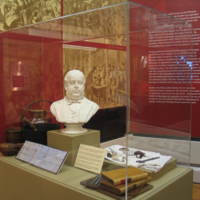
Revealing Histories: Remembering Slavery (Touchstones Rochdale)
Touchstones Rochdale was one of eight heritage bodies in the ‘Revealing Histories: Remembering Slavery’ partnership in Greater Manchester. The project set out to explore the history, impact and legacy of slavery on Britain through collections and community links in the North West.
Rochdale's connections to slavery were explored though two exhibitions at Touchstones Rochdale, which featured museum trails and family events. 'The Fight to End Slavery: A Local Story' examined the town's role in the struggle to end slavery in North America, including the work of prominent abolitionists from Lancashire. The exhibition also looked at the impact of the Lancashire cotton famine, which occurred as a result of the blockade of southern American ports during the Civil War. 'Linking Threads: Textile Industrialists and the Art Collection' focused on works given to the Rochdale Art Gallery collection by benefactors who had links to the local textile industry, such as Robert Taylor Heape and Richard Heape.
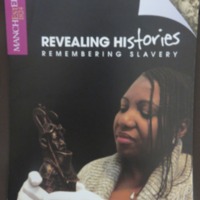
Revealing Histories: Remembering Slavery (The Manchester Museum)
The Manchester Museum was one of eight heritage bodies in the ‘Revealing Histories: Remembering Slavery’ partnership in Greater Manchester. The project set out to explore the history, impact and legacy of slavery on Britain through collections and community links in the North West.
The Manchester Museum examined the role of Victorian institutions in promoting the racist thinking that justified slavery; objects and images in the museum's collections were identified as having been used to support racist ideas. Events and workshops included a debate based on the question 'Are museums racist?', plus sessions on African dance traditions. 'This Accursed Thing' was a promenade performance around the museum, examining the transatlantic slave trade through the eyes of those involved - abolitionists and traders, slavers and slaves - and looking at ways in which individuals attempted to dispel racist myths. The 'Myths about Race' exhibition was the culmination of Manchester Museum's participation in the Revealing Histories project.